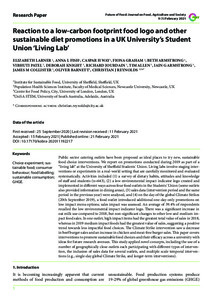Reaction to a low-carbon footprint food logo and other sustainable diet promotions in a UK University’s Student Union ‘Living Lab’
| dc.date.accessioned | 2021-03-05T14:38:34Z | |
| dc.date.available | 2021-03-05T14:38:34Z | |
| dc.date.issued | 2021-02-21 | |
| dc.identifier | doi:10.17170/kobra-202011192217 | |
| dc.identifier.uri | http://hdl.handle.net/123456789/12593 | |
| dc.language.iso | eng | eng |
| dc.rights | Namensnennung 4.0 International | |
| dc.rights.uri | http://creativecommons.org/licenses/by/4.0/ | |
| dc.subject | choice experiment | eng |
| dc.subject | sustainable food | eng |
| dc.subject | consumer behaviour | eng |
| dc.subject | food labelling | eng |
| dc.subject | sustainable consumption | eng |
| dc.subject | GHGE | eng |
| dc.subject.ddc | 300 | |
| dc.subject.ddc | 630 | |
| dc.title | Reaction to a low-carbon footprint food logo and other sustainable diet promotions in a UK University’s Student Union ‘Living Lab’ | eng |
| dc.type | Aufsatz | |
| dcterms.abstract | Purpose: Public sector catering outlets have been proposed as ideal places to try new sustainable food choice interventions. We report on promotions conducted as part of a “Living Lab” at the University of Sheffield Students Union during 2019.Methodology: Activities include 1) a survey of dietary habits, attitudes and knowledge of staff and students (n=643). 2) A low environmental impact indicator logo was created and implemented in different ways across four food outlets in the Students Union (some outlets also provided information in dining areas). 3) Sales data (intervention period and the same period in the previous year) were analysed. 4) On the day of the global Climate Strikes (20th September 2019), a food outlet introduced additional one-day-only promotions on low impact menu options; sales impact was assessed.Findings: An average of 39.4% of respondents recalled the low environmental impact indicator logo. There was a significant increase in use of oat milk compared to 2018, but non significant changes to other low and medium impact food sales. In one outlet, high impact items had the greatest total value of sales in 2018, whereas in 2019 medium impact foods had the greatest value of sales, suggesting a positive trend towards less impactful food choices. The Climate Strike intervention saw a decrease in beef burger sales and an increase in chicken and meat-free burger sales.Originality/value: This paper covers interventions to promote sustainable food choices and their efficacy across a University with ideas for future avenues of research. | eng |
| dcterms.accessRights | open access | |
| dcterms.creator | Larner, Elizabeth | |
| dcterms.creator | Fish, Anna L. | |
| dcterms.creator | Way, Caspar H. | |
| dcterms.creator | Graham, Fiona | |
| dcterms.creator | Armstrong, Beth | |
| dcterms.creator | Patel, Vibhuti | |
| dcterms.creator | Knight, Deborah | |
| dcterms.creator | Jourdain, Richard | |
| dcterms.creator | Allen, Tim | |
| dcterms.creator | Armstrong, Iain G. | |
| dcterms.creator | Collister, James M. | |
| dcterms.creator | Barnett, Oliver | |
| dcterms.creator | Reynolds, Christian John | |
| dc.subject.swd | Entscheidung | ger |
| dc.subject.swd | Experiment | ger |
| dc.subject.swd | Nachhaltigkeit | ger |
| dc.subject.swd | Lebensmittel | ger |
| dc.subject.swd | Verbraucherverhalten | ger |
| dc.subject.swd | Lebensmittelkennzeichnung | ger |
| dc.subject.swd | Verbrauch | ger |
| dc.subject.swd | Treibhausgas | ger |
| dc.type.version | publishedVersion | |
| dcterms.source.identifier | EISSN 2197-411X | |
| dcterms.source.issue | No. 1 | |
| dcterms.source.journal | Future of Food: Journal on Food, Agriculture & Society | eng |
| dcterms.source.volume | Vol. 9 | |
| kup.iskup | false | |
| dcterms.source.articlenumber | 321 |


